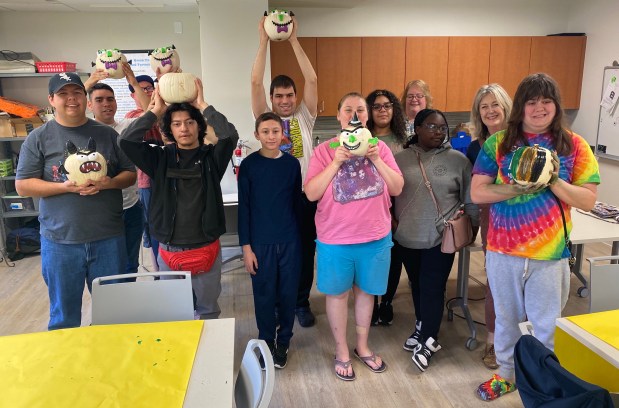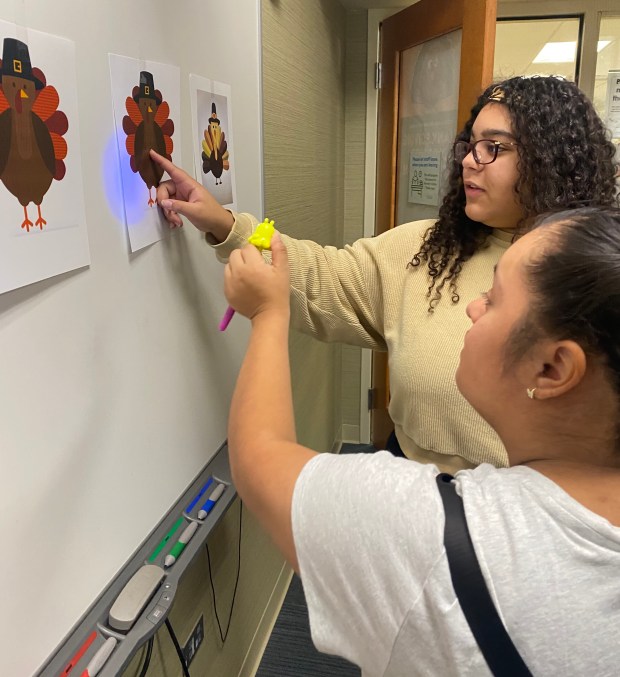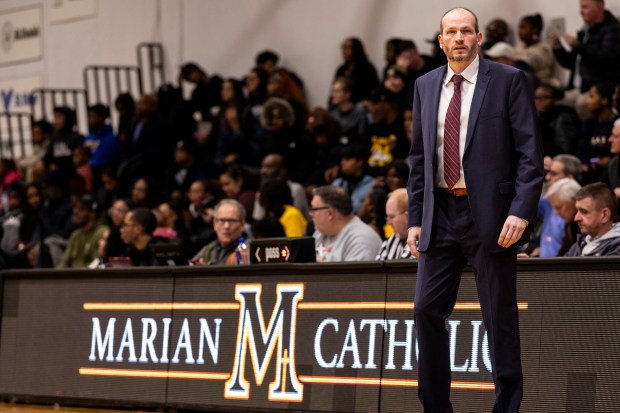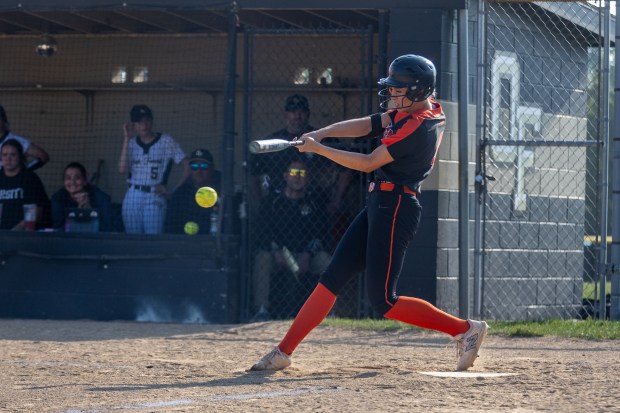As kids with disabilities become young adults, there’s less for them to do, fewer places to go.
An idea sparked in 2020 ensured the Evergreen Park Public Library would be among those places and has grown into a program that helps young adults with disabilities forge connections to the community.
Teen librarian Mary Black and then library director Nicki Seidl cowrote a grant from Autism Welcome Here, receiving about $1,000 to create a year of programming. “When we researched for the grant, what we found was that for teens and young adults, recreational opportunities for them decrease as they get older, and wouldn’t it be great for the library to open its doors and start (a program) this year.”
Autism Welcome Here is an organization run by Boston librarian Barbara Klipper, who was on the grant committee, Black explained. “They liked our program, so we got the award and we began our programming with a holiday open house in December of 2021.”
Evergreen Park’s library was among the first suburban libraries to reopen during the COVID-19 pandemic, so participants had to wear masks, but at least 12 young adults attended, she said.
Stacks Social Club is aimed at young adults with disabilities but older adults also participate. “We never turn anyone away, so it’s not for children. It’s really post-high school,” Black said. “We’re so glad to have this opportunity for them.”
The club, which typically involves 8 to 12 members, meets in the library’s teen room the third Sunday every month from September to May.
Meetings start with small activities like Magna Tiles and coloring. “Everyone is getting relaxed, talking, greeting,” Black said. “When we start the program, we do some warmups, greeting and we start our activity.”
Those activities include golfing in the library, playing musical instruments and reading a script aloud, and sometimes gathering at the Evergreen Park Recreation Center for its game day. “We focus on social and recreation,” Black said. “We touch on literacy, but the focus is to welcome them to the library.”
During breaks in the session, members can browse different areas of the library, looking for a video game or book or other materials.
“You don’t need a degree in special education to do this,” Black said. “You just need a big heart and a sense of humor.”
New members learn about the club because of Black’s networking. “I have relationships with the high schools, colleges, recreation departments at Oak Lawn, Chicago. Everybody is welcome,” she said. “Social media. I do a newsletter that I send to the families and will include interesting things they might need resource-wise.”
Some of those resources include a sensory kit made up of a seat wedge and a weighted vest, which can cost $100, so families can try them before investing. Some people who use the vest are AERO students, the special education branch for Argo, Evergreen, Revis and Oak Lawn Community high schools, set up for post-high school students until they turn 22. It’s “another way our library partners and reaches out to the community,” Black said.
Partnerships are a big reason why the club is a success, she said, citing a donation by Beverly Ridon that funded a year of programming; Whole Foods’ snack donations for food literacy programs; and professor Meg Carroll of St. Xavier University, who leads the master’s degree special education program at St. Xavier University and whose students participate in exchange for observation hours. “She’s been a wonderful resource and partner,” Black said.
Alice Flaherty of Evergreen Park has two daughters, 22 and 26, have participated in Stacks Social Club from the beginning.
“We always go. We always have fun. It’s a very accepting atmosphere,” she said, adding that its volunteers are wonderful. “The way they mix in and talk with everybody, you don’t feel like there’s a difference in participation. Everyone is just there to have fun.”
Her daughters enjoy the activity each month, whether it’s an escape room, meeting a service dog or learning about composting. “The holiday singalong last December was great,” she said.
She and Black are longtime friends. “She’s been part of my girls’ lives since they were born,” she shared, adding that when Black got the idea for Stacks Social, she talked to her about it.
“Mary worked for years in special education at Oak Lawn high School, so she’s very sensitive to the needs of aging (adults). People with disabilities have different life cycles like everyone else, but it seems like after school there’s not as many opportunities for socializing,” Flaherty said, adding that the club “allows for meaningful exchange and interaction. There’s something to learn.”

Feeling welcome in the community is a good feeling,” she said. “That’s our library. We have gotten to know families that we see regularly at the events, so it’s a place where we feel welcome and not isolated.”
The aspect of community also is important to Jennifer Sagrati, of Chicago’s Beverly neighborhood. Her 20-year-old daughter Michaela, who lives in a condo in Oak Lawn, has been a club member since it began.
“I’m supportive of the library and Mary and what she’s doing because there aren’t many programs like this,” Sagrati explained, adding that the western suburbs where she works have a lot more opportunities than the southern suburbs. “Finding that kind of thing is important.”
Sagrati has perhaps more insights into the field than other parents because she’s been a social worker for 24 years, including at Evergreen Park Community High School, before she had children, and now at Giant Steps, an autism therapeutic day school in Lisle where Michaela attended for 12 years.
She has a business connecting families to resources in their community and had organized and ran a teen club for members of all abilities. “That’s when Mary reached out to me and said she wanted to do what I was doing but at the library,” Sagrati said. “She found out about it because a different parent, their child was participating in my program.”
Sagrati said having Stacks Social Club means her daughter “has another palace to go to have community. She goes with her friend. It’s a different group every time so it’s a way to meet other people to expand her social network and just feel connected.”
It’s clear that Michaela enjoys it because even though she typically stays up late to watch “Saturday Night Live,” she’ll get up early and change out of her pajamas on a Sunday. “She looks forward to it and likes the people there. Mary has hit on all the right things,” Sagrati said. “I think Michaela likes it because there’s variety.
“You do need to find the right people who think your kid is cool. Mary’s given them that safe space there, which is great.”
Sagrati said the club helps fulfill a basic need. “I can’t stress enough to parents the importance of connecting outside of a school setting. As parents, we become very reliant on schools to supply everything,” she said.
Melinda Moore is a freelance reporter for the Daily Southtown.





